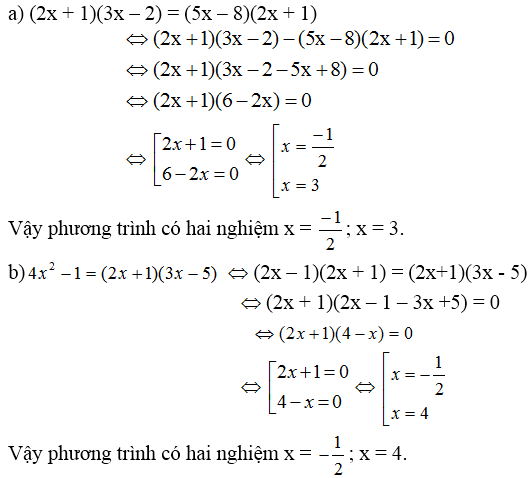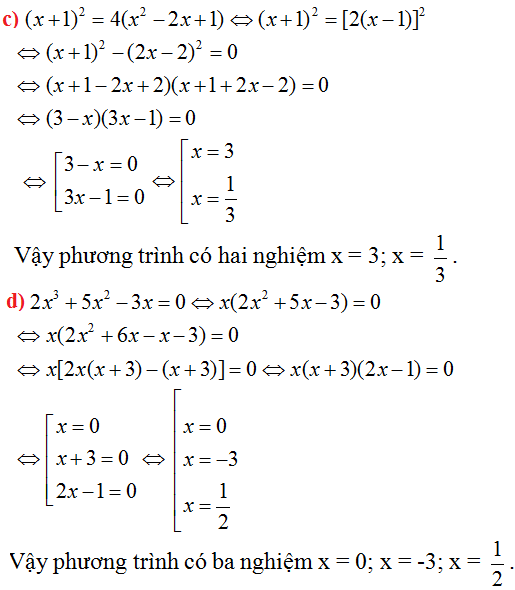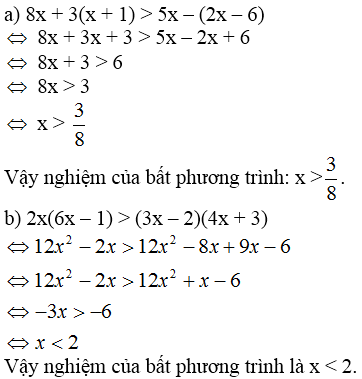Hãy nhập câu hỏi của bạn vào đây, nếu là tài khoản VIP, bạn sẽ được ưu tiên trả lời.

a) (x-1)(5x+3)=(3x-8)(x-1)
= (x-1)(5x+3)-(3x-8)(x-1)=0
=(x-1)[(5x+3)-(3x-8)]=0
=(x-1)(5x+3-3x+8)=0
=(x-1)(2x+11)=0
\(\Leftrightarrow\) x-1=0 hoặc 2x+11=0
\(\Leftrightarrow\) x=1 hoặc x=\(\dfrac{-11}{2}\)
Vậy S={1;\(\dfrac{-11}{2}\)}
b) 3x(25x+15)-35(5x+3)=0
=3x.5(5x+3)-35(5x+3)=0
=15x(5x+3)-35(5x+3)=0
=(5x+3)(15x-35)=0
\(\Leftrightarrow\) 5x+3=0 hoặc 15x-35=0
\(\Leftrightarrow\) x=\(\dfrac{-3}{5}\) hoặc x=\(\dfrac{7}{3}\)
Vậy S={\(\dfrac{-3}{5};\dfrac{7}{3}\)}
c) (2-3x)(x+11)=(3x-2)(2-5x)
=(2-3x)(x+11)-(3x-2)(2-5x)=0
=(3x-2)[(x+11)-(2-5x)]=0
=(3x-2)(x+11-2+5x)=0
=(3x-2)(6x+9)=0
\(\Leftrightarrow\) 3x-2=0 hoặc 6x+9=0
\(\Leftrightarrow\) x=\(\dfrac{2}{3}\) hoặc x=\(\dfrac{-3}{2}\)
Vậy S={\(\dfrac{2}{3};\dfrac{-3}{2}\)}
d) (2x2+1)(4x-3)=(2x2+1)(x-12)
=(2x2+1)(4x-3)-(2x2+1)(x-12)=0
=(2x2+1)[(4x-3)-(x-12)=0
=(2x2+1)(4x-3-x+12)=0
=(2x2+1)(3x+9)=0
\(\Leftrightarrow\)2x2+1=0 hoặc 3x+9=0
\(\Leftrightarrow\)x=\(\dfrac{1}{2}\)hoặc x=\(\dfrac{-1}{2}\) hoặc x=-3
Vậy S={\(\dfrac{1}{2};\dfrac{-1}{2};-3\)}
e) (2x-1)2+(2-x)(2x-1)=0
=(2x-1)[(2x-1)+(2-x)=0
=(2x-1)(2x-1+2-x)=0
=(2x-1)(x+1)=0
\(\Leftrightarrow\) 2x-1=0 hoặc x+1=0
\(\Leftrightarrow\) x=\(\dfrac{-1}{2}\) hoặc x=-1
Vậy S={\(\dfrac{-1}{2}\);-1}
f)(x+2)(3-4x)=x2+4x+4
=(x+2)(3-4x)=(x+2)2
=(x+2)(3-4x)-(x+2)2=0
=(x+2)[(3-4x)-(x+2)]=0
=(x+2)(3-4x-x-2)=0
=(x+2)(-5x+1)=0
\(\Leftrightarrow\) x+2=0 hoặc -5x+1=0
\(\Leftrightarrow\) x=-2 hoặc x=\(\dfrac{1}{5}\)
Vậy S={-2;\(\dfrac{1}{5}\)}

a)(2x+1)(3x-2)=(5x-8)(2x+1)
⇔(2x+1)(3x-2)-(5x-8)(2x+1)=0
⇔(2x+1)(3x-2-5x+8)=0
⇔(2x+1)(-2x+6)=0
⇔2x+1=0 hoặc -2x+6=0
1.2x+1=0⇔2x=-1⇔x=-1/2
2.-2x+6=0⇔-2x=-6⇔x=3
phương trình có 2 nghiệm x=-1/2 và x=3

\(\left(x-1\right)\left(x+1\right)-2\left(2x+3\right)\le\left(x-2\right)^2+x\)
\(\Leftrightarrow x^2-1-4x-6\le x^2-4x+4+x\)
\(\Leftrightarrow x^2-4x-7\le x^2-3x+4\)
\(\Leftrightarrow x^2-4x-x^2+3x\le7+4\)
\(\Leftrightarrow-x\le11\)
\(\Leftrightarrow x\le-11\)

a, \(\frac{1-x}{x+1}+3=\frac{2x+3}{x+1}\)
\(=>\frac{1-x+x+1}{x+1}+2=\frac{1}{x+1}+2\)
\(=>\frac{2}{x+1}=\frac{1}{x+1}\)
\(=>2x+2=x+1\)
\(=>2x-x=1-2=-1\)
\(=>x=-1\)
vậy nghiệm của phương trình trên là {-1}
À quên ĐKXĐ của câu a là \(x\ne-1\)
Nên \(x\in\varnothing\)nhé :v

\(a,\left(2x^2+1\right)+4x>2x\left(x-2\right)\)
\(\Leftrightarrow2x^2+1+4x>2x^2-4x\)
\(\Leftrightarrow4x+4x>-1\)
\(\Leftrightarrow8x>-1\)
\(\Leftrightarrow x>-\frac{1}{8}\)
\(b,\left(4x+3\right)\left(x-1\right)< 6x^2-x+1\)
\(\Leftrightarrow4x^2-4x+3x-3< 6x^2-x+1\)
\(\Leftrightarrow4x^2-x-3< 6x^2-x+1\)
\(\Leftrightarrow4x^2-6x^2< 1+3\)
\(\Leftrightarrow-2x^2< 4\)
\(\Leftrightarrow x^2>2\)
\(\Leftrightarrow x>\pm\sqrt{2}\)

a) \(8x+3\left(x+1\right)>5x-\left(2x-6\right)\)
⇒ \(8x + 3x + 3 > 5x - 2x + 6\)
⇒ \(11x+3>3x+6\)
⇒ \(11x - 3x > 6 -3\)
⇒ \(8x > 3\)
⇒ \(8x.\dfrac{1}{8}>3.\dfrac{1}{8}\)
⇒ \(x>\dfrac{3}{8}\)
S = \(\left\{x\backslash x>\dfrac{3}{8}\right\}\)
b) \(2x(6x-1) > (3x -2)(4x+3)\)
⇒ \(12x^2 - 2x > 12x^2 +9x -8x -6\)
⇒ \(12x^2 - 2x > 12x^2 + x - 6\)
⇒ \(-2x-x>12x^2 -6-12x^2\)
⇒ \(- 3x > -6 \)
⇒ \(x > 2\)
S = {x / x > 2}

(1) cho A = 4,25 x(b + 41,53 ) - 125. tim b de A co gia tri =300 . (2)



sẽ là dấu =
Là sao vậy bạn..bạn vui lòng giải giúp mình với